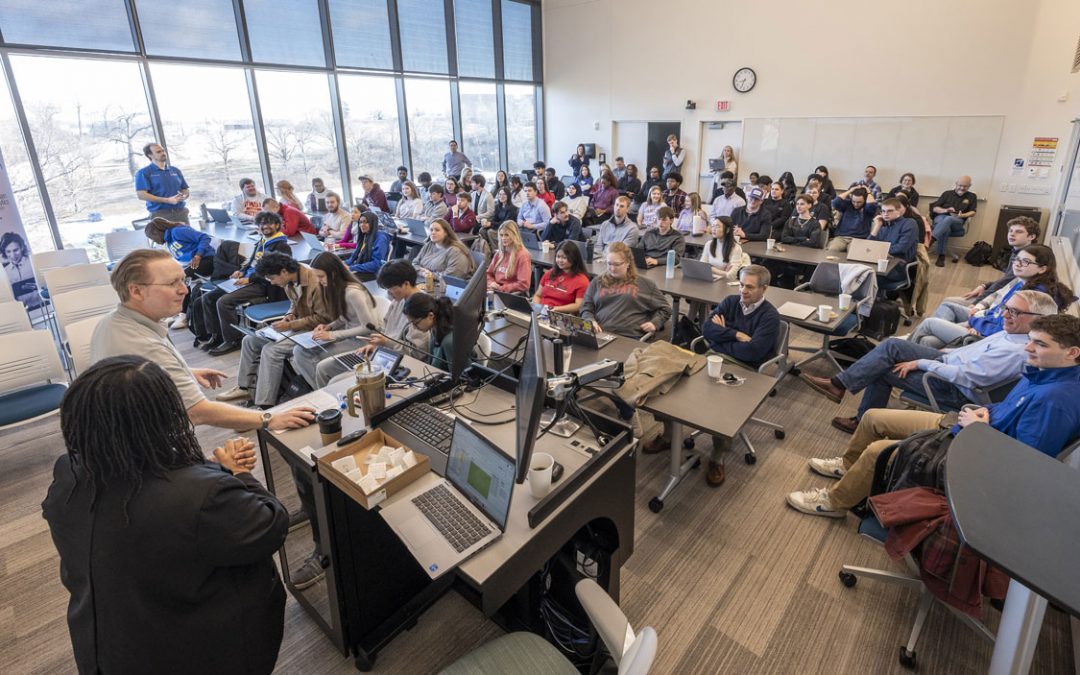
Julia Talbert found her passion for genetics while studying biology at UMSL. She earned her degree in December and is now working as a research assistant at the Danforth Plant Science Center. (Photo by Derik Holtmann)
When other kids might have been watching cartoons on Saturday mornings, Julia Talbert was glued to Animal Planet. From a young age, Talbert loved learning about science and animals – so much so that she planned to become a veterinarian.
In a high school AP biology class, she started learning about genetics, which she immediately found fascinating. After graduating, she spent her summer doing her own personal research and learning more about genetic diseases. She decided to pursue her passion at the University of Missouri–St. Louis because of the positive reputation of the Department of Biology, the affordability – she received several scholarships, including the Chancellor’s Scholarship and Proud to be First Scholarship – and the Pierre Laclede Honors College, which offered a unique, discussion-based learning environment.
As Talbert took more classes in the biology department, she came to realize genetics was her true passion.
“After getting into university, when we went even further into depth into that, that curiosity really blossomed even more,” she said. “It felt right. I felt like this is where I needed to be, what I wanted to do, and it was a passion that definitely blossomed.”
When Talbert took her first genetics course, she would often stay after class to ask questions of Bethany Zolman, an associate professor and chair of the Department of Biology. She soon formed a relationship with Zolman and was invited to join her lab, which researches plant genetics. Talbert’s first project with the Zolman Lab involved a collaboration with Associate Professor Lon Chubiz’s microbiology lab to study the impact of WBG-1, a relatively newly found bacteria in soil, on the development of Arabidopsis thaliana, a small, fast-growing member of the mustard family.
Talbert spent almost an entire semester working out kinks in the project, including the timeframe and what media to use, and, frustratingly, she saw several experiments ruined due to contamination from mold or other bacteria. But finally, after several successful experiments, she was able to show that the bacteria seem to have no relationship with the plant. In spring 2024, she presented her research during the annual Undergraduate Research Symposium at UMSL, where she won an award for best poster content. She also presented her research alongside peers from across the University of Missouri System during the Undergraduate Research Day at the Missouri State Capitol.
“It was a really fun project to work on, and being my first big project, that was really great,” she said. “It was just a fantastic experiment, and I really loved it. It’s definitely near and dear to my heart.”
After wrapping up that experiment, Talbert worked on another project in the Zolman Lab – this one focused on growing a group of plants with specific mutations and identifying the phenotypes caused by those mutations.
Initially, Talbert wasn’t all that interested in working with plants, but her time working in the Zolman lab solidified her passion. As she started hearing her professors and teaching assistants speak highly of the Danforth Plant Science Center and its mission, she knew it was something she wanted to be a part of, and she landed a position as a research assistant in September. As part of the Shakoor Lab, she works with Primary Investigator Nadia Shakoor to research sorghum, one of the top five cereal crops grown in the world.
“The goal of this lab is specifically to increase the yield of this plant, to make it more effective especially as a food source for people who need it, and also animals,” Talbert said. “Another big thing we’re also working on is being able to create a plant that is able to reduce carbon emissions by taking in more carbon from the air and reversing the effects of climate change. The goal is to make it an even better plant for the people that need it.”
The bulk of Talbert’s role involves collecting data for the project investigators at the Danforth Center’s field research site in St. Charles. She measures plant height and diameter, collects biomass, collects dirt samples to analyze the bacteria in the soil, collects seeds to plant in the future and uses an in vivo imaging system to collect images of the roots in the soil without damaging the plant. The job involves a lot of manual labor, and the days can be long and taxing – especially during St. Louis’ scorching summers and bitter winters – but Talbert finds the work fulfilling knowing that it will help others.
“That’s the reason why I wanted to go to the Danforth – I really love their mission about wanting to help people and to improve science,” Talbert said. “I love all that they do to give back to St. Louis and this area. It was just something I wanted to be a part of. That’s the kind of impact I want to leave.”
In December, Talbert graduated with a bachelor’s degree in biology as well as a certificate from the Pierre Laclede Honors College, and now, she’s focused on continuing her work as a research assistant at the Danforth Center and applying for PhD programs in genetics. She plans for research to remain a central part of her career, and while she’d love to continue to work at the Danforth Center, she can also see herself working with patients with genetic diseases in a medical setting.
“I would hope that 10 or 20 years down the line, I would have a main area or question that I’m focused on and can really put a lot of effort in,” she said. “It’d be really awesome to have some papers out and be able to showcase my findings with people and other fellow researchers, the community and the government to really make some change. All this is going to help people wanting to help the world; specifically in the research area with plants, to be able to fight climate change, hunger and all these really big issues. That’s kind of the why of everything – just wanting to help people. I hope at that time I’ll make some contribution to be able to change the world. Changing the world has always been the goal.”
Talbert feels her experience at UMSL has equipped her to tackle such ambitious goals. She credits the Department of Biology with giving her the knowledge and skills necessary to be successful in the field and for helping her land a job at the Danforth Center – and one she loves, at that – after graduation. The Honors College, she said, prepared her for the world. She was able to master skills for thinking critically and expressing ideas, such as writing a good essay or making a scientific poster, which she knows are vital in any field.
Recently, Talbert has spoken to a few freshman classes, which has helped her reflect back on her own journey and the advice she wishes she had received when she was younger. She encourages students to be bold, put themselves out there and not let their own thoughts about their abilities get in the way of what they want to do.
“I feel like I’ve had so many lost opportunities from thinking, ‘I’m not smart enough to do that,’ ‘I’m not good enough to do that,’ or ‘I don’t think I can handle that,’’’ she said. “But once it’s passed, I realize I could have. That’s something I would encourage everyone to do – really put yourself out there, challenge yourself and not let your own limitations get in the way. That’s definitely something I’ve had to learn the hard way. Don’t let your own limitations, whether you put them on yourself or the world puts them on you, get in the way of your dreams.”














